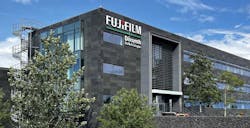Fujifilm Diosynth Biotechnologies looks to leverage $8B global manufacturing investment
Under a modular production model, global CDMO Fujifilm Diosynth Biotechnologies — which develops and manufactures biologics, vaccines and advanced therapies — is constructing identical large-scale facilities in the U.S. and Europe meant to seamlessly integrate manufacturing, regardless of location, for its customers.
In 2024, the company was “still very much in the planning mode of building this network we call KojoX, which is the Japanese name for facility and improvement,” CEO Lars Petersen told Pharma Manufacturing. Petersen said the CDMO’s facilities are designed, constructed, and ultimately will be operated as one worldwide network, which he contends “nobody’s really done before.”
Petersen, who took the helm as CEO in June 2023 and previously served in several executive roles in the company, is the driving force behind Fujifilm Diosynth Biotechnologies’ global ecosystem expansion that includes sites in Hillerød, Denmark, and Holly Springs, North Carolina. Since 2011, Fujifilm Corporation has invested over $8 billion to create the biologics manufacturing network, according to Petersen, who acknowledged that there’s been “a lot of pressure” on its leadership as to when the investment will start to generate revenue.
Of the more than $8 billion investment in manufacturing, Petersen estimates that about $4 billion of that infrastructure will be “operationalized” by the end of 2025, finally adding “revenue streams” for the company.
“We’ve talked about this for a long time” but in November 2024 the CDMO opened the first KojoX node in the network in Denmark, Petersen said. The first phase of its expansion at the Hillerød site added six mammalian cell bioreactors, bringing the facility’s total current capacity to twelve 20,000L bioreactors, which the company claims will be the largest end-to-end biopharmaceutical manufacturing site in Europe.
The next phase at Hillerød will include eight additional 20,000L bioreactors and two downstream processing streams, with fill/finish production slated to start by mid-2025 with full expansion expected to be operational by 2026.
A “sister” site is being built by Fujifilm Diosynth Biotechnologies in North Carolina, Petersen said. In April 2024, the company announced an investment of $1.2 billion in its large-scale cell culture CDMO business to further expand the planned end-to-end biomanufacturing site in Holly Springs, bringing the total investment in the facility to more than $3.2 billion. In 2025, operations will begin for the first phase of the facility in Holly Springs.
“This year is very much the year of operationalizing everything we’ve been planning for so long,” Petersen said. “This is a big deal for us because starting up these facilities is very complicated and very expensive.”
The planned large-scale Holly Springs cell culture facility will add eight 20,000L mammalian cell culture bioreactors by 2028 to the previously planned eight 20,000L bioreactors for bulk drug substance under the initial investment. The goal is to create the largest cell culture biopharma CDMO facility in North America.
With four sites in the U.S., including the expansion of its cell therapy manufacturing facility in Thousand Oaks, California with two new independent production suites that increase cleanroom capacity, Petersen contends that Fujifilm Diosynth Biotechnologies is well positioned to meet the needs of clients. The cGMP suites in Thousand Oaks include automated cell separation, selection, and expansion equipment, as well as in-built decontamination for quick changeovers and HVAC systems that support Grade B or C backgrounds.
The CDMO’s development plans have also included the United Kingdom. In August 2024, Fujifilm Diosynth Biotechnologies announced the opening of its microbial fermentation manufacturing facility in Billingham, U.K. The site expansion tripled microbial production throughput with the addition of a new line equipped with two 4000L fermenters, a primary separations suite and a modular purification suite.
“In 2026, we will add more facilities — one on a smaller scale in the U.K. — and then the network becomes multiple scales especially in the [monoclonal antibodies] field,” Petersen said. By far the biggest investment the company is making is in the mAbs space “which continues to grow,” he added.
Fujifilm Corporation announced in October 2022 that it is building the company’s first Japanese bio-CDMO facility in Toyama City. Fujifilm Toyama Chemical invested in the new site, which will be operational in fiscal year 2026 and will include dual-use facilities capable of manufacturing antibody drugs and antibody-drug conjugates and switching to the manufacture of mRNA vaccines and genetically-engineered protein vaccines.
Petersen said when the Toyama site comes online, it will become part of Fujifilm Diosynth Biotechnologies’ network of service offerings.
About the Author
Greg Slabodkin
Editor in Chief
As Editor in Chief, Greg oversees all aspects of planning, managing and producing the content for Pharma Manufacturing’s print magazines, website, digital products, and in-person events, as well as the daily operations of its editorial team.
For more than 20 years, Greg has covered the healthcare, life sciences, and medical device industries for several trade publications. He is the recipient of a Post-Newsweek Business Information Editorial Excellence Award for his news reporting and a Gold Award for Best Case Study from the American Society of Healthcare Publication Editors. In addition, Greg is a Healthcare Fellow from the Society for Advancing Business Editing and Writing.
When not covering the pharma manufacturing industry, he is an avid Buffalo Bills football fan, likes to kayak and plays guitar.
